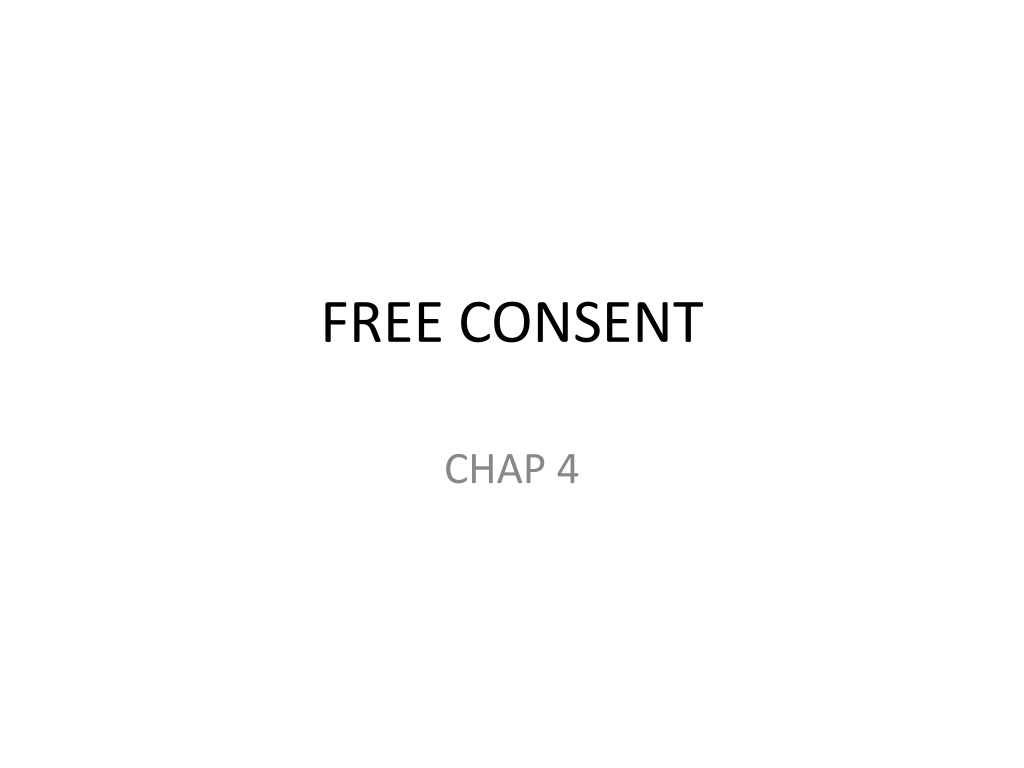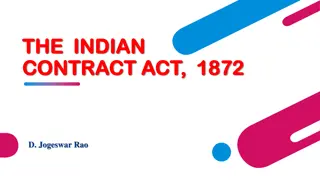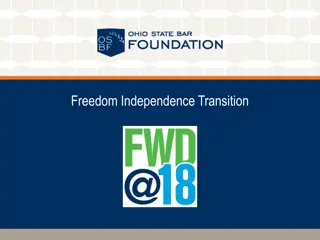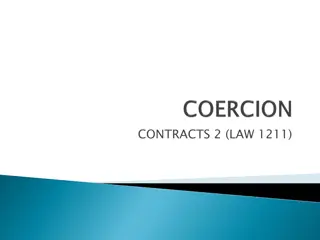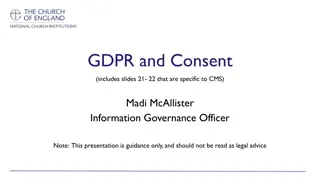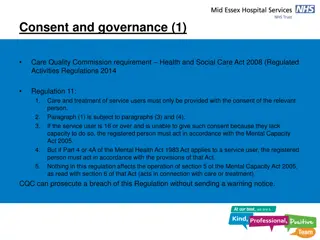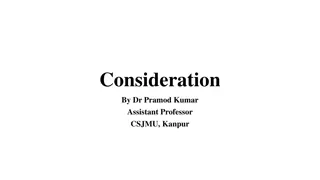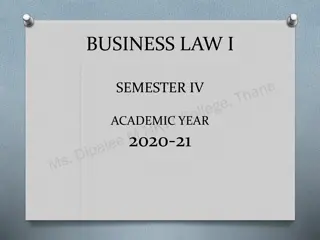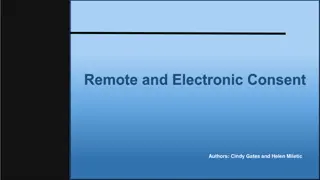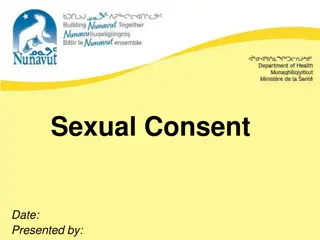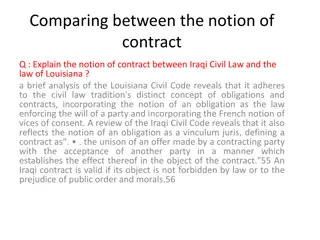Understanding Free Consent and its Components in Indian Contract Law
Free consent in Indian contract law refers to consent that is not influenced by coercion, undue influence, fraud, misrepresentation, or mistake. Coercion involves committing or threatening to commit acts forbidden by the Indian Penal Code to force someone into an agreement. Undue influence occurs when one party dominates the will of the other unfairly. The distinction between coercion and undue influence lies in the type of force exerted - physical in coercion and mental in undue influence.
Download Presentation

Please find below an Image/Link to download the presentation.
The content on the website is provided AS IS for your information and personal use only. It may not be sold, licensed, or shared on other websites without obtaining consent from the author. Download presentation by click this link. If you encounter any issues during the download, it is possible that the publisher has removed the file from their server.
E N D
Presentation Transcript
FREE CONSENT CHAP 4
SEC 14- Free consent:- Consent is said to be free when it is not caused by- a. Coercion, as defined in S.15 b. Undue influence , as defined in S.16 c. Fraud, as defined in S.17 d. Misrepresentation, as defined in 18 or e. Mistake , subject to the provisions of Ss. 20,21,22
COERCION S.15 Coercion: committing or threatening to commit, any act forbidden by the Indian Penal Code or the Unlawful detaining, or threatening to detain any property, to the prejudice of any person whatever, with the intention of causing any person to enter into an agreement
1. Committing or threatening to commit any act E.g. 1. An agent refused to handover the accounts book of the principal, unless the principal paid him Rs 50,000/-. This amounted to coercion E.g. 2. A hindu widow, aged 13 years was forced to adopt a boy under the threat that her husband s body will not be allowed to be removed unless she adopted that boy. Here, it amounted to coercion by threatening to commit an act. ( Ranganayakiammal v Alwar Shetty (1890)
2. The act must be forbidden by the Indian Penal Code 3. Coercion may be exercised over person or property 4. Coercion may be exercised by the contracting party or by any one on his behalf 5. The acts of coercion must be done with the intention of causing the other party to enter into a contract
II) UNDUE INFLUENCE Unfair use of one s position or power S.16 Undue influence Where the relations subsisting between the parties are such that one of the parties is in a position to dominate the will of the other and uses that position to obtain an unfair advantage over the other Circumstances where undue influence is presumed to exist:- 1. When one party stands in a fiduciary relation to another (e.g. teacher and student) 2. When a person s mental capacity is affected by reasons of age, illness( medical attendant and patient) 3. Where there is real or apparent authority (employer and employee, income tax-officer and tax payer)
Distinction between Coercion and Undue Influence Definition Type of force- physical force in C Mental force- U Relationship
III) FRAUD S. 17 Fraud means and includes any of the acts stated committed by a party to a contract or with his connivance , or by his agent, with intent to deceive another party thereto or his agent , or to induce him to enter into a contract Essential elements of Fraud:- 1. The fraudulent act must be committed by a party to the contract 2. False representation 3. Representation as to fact 4. Actually deceived 5. Suffered loss
ACTS WHICH CONSTITUTES FRAUD 1. Suggesting as to a fact by one who, does not believe it to be true 2. Active concealment of a fact by one having knowledge or belief of the fact 3. A promise made without any intention of performing it 4. Any Act fitted to deceive 5. Any act of omission which the law specifically declares it to be fraudulent
DOES SILENCE AMOUNT TO FRAUD Mere silence as to facts, likely to affect the willingness of a party to enter into a contract is not fraud, as no party is under an obligation to disclose the whole truth to the other party. Example:- A wants to sell off his scooter, as it is giving trouble. He is under no obligation to disclose it. Non disclosure will not amount to fraud.
MISREPRESENTATION IS making a false statement of facts, by a party without any intention to deceive the other party S.18 a false representation of fact made innocently or non disclosure of a material fact, without any intention to deceive the other party ELEMENTS OF MISREPRESENTATION 1. By a party to the contract 2. False representation 3. Representation as to fact 4. Object 5. The party must have actually acted 6. e
MISTAKE An error of judgment CLASSIFICATION OF MISTAKE A) MISTAKE OF LAW I. MISTAKE OF INDIAN LAW- Ignorantia juris non excusat ( ignorance of law is not an excuse) II. MISTAKE OF FOREIGN LAW B) MISTAKE OF FACT I. BILATERAL both the parties are under a mistake II. UNILATERAL one party is under a mistake
